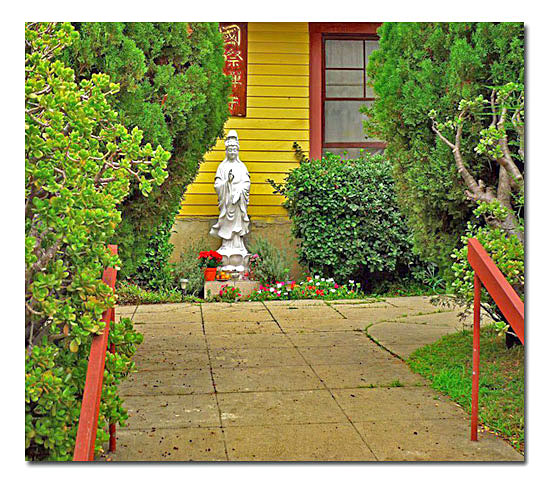An-Cu Summer Intensive

Dwelling
in Peace
An-Cu (Ango
in Japanese) literally means "dwelling in peace" and refers to a
tradition honored in every Buddhist country in the world since the
time of the Buddha. It is also known as three-month training, summer
intensive or rainy season retreat.
All year long,
monks travel from place to place or are available at their monasteries
to teach and counsel laypeople and novices. For three months of
the year, these monastics retreat into their own practice, to study
and meditate, to enhance their understanding.
This tradition
began because of the compassion of the Buddha. In India, during
the rainy season, the constant moisture brings out all the various
kinds of insects, lizards and other small animals. It becomes impossible
to travel anywhere without killing some sentient being traveling
across the path under one's feet. So Sakyamuni told the monks to
take advantage of this time to stay inside and to intensify their
own practice, studying and meditating, thereby benefitting all concerned.
Participate
in Three-Month Training
Three-month
training is required for monks who are novices working toward further
ordination or who are fully ordained and wish to advance in dharma
age. However, it is also a good opportunity for lay practitioners
to intensify their practice. It is a limited amount of time, and
everyone can decide just how much more time and effort they can
commit to. And, because the program at IBMC is intensified, there
are more opportunities to join in. The meditative energy in the
zendo becomes stronger, making it easier to practice. The community
effort is reinforcing.
The opening
ceremony for our three-month summer training is done to invite the
Dharma Protectors to come to the four corners of the monastery grounds.
Since the monks stay in the compound during this time, the Dharma
Protectors come and stay with them to protect them. They also protect
the monastery itself. These four strong Dharma Protectors can help
create a spiritual atmosphere which brings peace and safety to our
neighborhood. Please join us.
Some Suggestions
For Intensifying Your Practice
We encourage
you to intensify your practice during this three months. If you
meditate once a week, try for twice. If you meditate 20 minutes
a day, make it 25 minutes. Come to Sunday services more often.
Become a vegetarian
for three months. Mahayana monks are traditionally vegetarian. This
reflects the practice of ahimsa or not harming. As we know now,
animal protein, especially in the amounts most Americans eat is
not healthy. However, if you have never been a vegetarian before,
be sure you are replacing the meat in your diet with vegetable protein
such as tofu or beans and rice. Some people eat eggs and dairy products.
If you have any health problems, please check with your doctor before
making this decision. Also, it may be better to cut back on meat
gradually so your body can adjust.
Start off each
day with taking refuge and reciting the precepts. When you wake
in the morning, say "I take refuge in the Buddha, I take refuge
in the Dharma, I take refuge in the Sangha." This means that we
go to these three jewels for guidance. When you do this, think of
what each of them means. The Buddha, of course, is the teacher,
a human being who became awakened. As we are all human beings and
all have the same nature, Buddha nature, we too have the potential
to become awakened. The Dharma refers to the teachings, what the
Buddha discovered and then taught, what others who have followed
the path have shared; it also refers to what we learn from living
in the world. The Sangha is the community of practitioners, the
monks as well as others who follow the Buddha's way. Together we
learn and support each other's practice.
Repeat the five
basic precepts accepted by all Buddhist practitioners. "I vow not
to take life. I vow not to take what is not given to me. I vow not
to indulge in improper sexual acts. I vow not to speak that which
is harmful. I vow not to become intoxicated." Think of how these
vows fit into your life. It will help you to see your daily actions
more clearly. If you do not keep the precepts 100%, it is not a
problem. The important thing is to become more and more conscious
about the effect our actions have on ourselves and others.
The Advanced
Class
This class,
taught by Ven. Dr. Karuna Dharma, is open to laypeople who have
been practicing and studying for at least a year. It is a part
of the summer training program, so class members are at various
levels of understanding, including fully-ordained monks, novice
monks, eight-precept laypeople and others. Contact Rev.
Karuna Dharma for more information on course topics and schedule.
